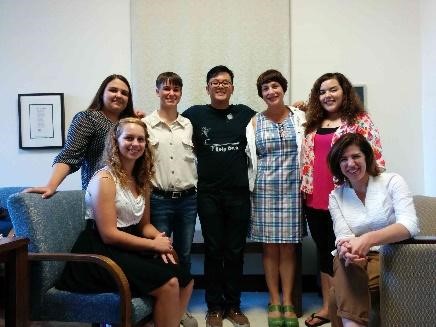Maura Giles-Watson is Assistant Professor of English (Drama) and Chair of Digital Humanities at the University of San Diego. She earned her bachelor's degree in Classical Studies from Harvard and her PhD in English (Medieval and Renaissance Studies) from the University of Nebraska-Lincoln. Maura's articles on classical, medieval, and Renaissance drama and performance culture have appeared in Early Theatre, Harvard Studies in Classical Philology, and in essay collections. Her current activities include two books-Performing Arguments: Debate in Poetry and Drama and The Last Minstrel: John Heywood in Performance -and developing and publishing new digital resources for the study and performance of Henrician drama for the Tudor Plays Project, which she directs. Currently, the Tudor Plays Project is filming an adaptation of the Tudor debate play Gentylnes and Nobylyte, based on the new Modern English performance text developed collaboratively by project participants (at tudorplays.org).
Title
Tudor Plays Project
Goal
To develop new digital resources for the study and performance of earlier Tudor drama (during the reign of Henry VIII).
Lesson Plans
In the short term, the Tudor Plays Project focused on Gentylnes and Nobylyte, which is a comic debate play that confronts issues of wealth, power, equity, and social class that are still current today. Gentylnes and Nobylyte was written for performance at the court of Henry VIII and/or on John Rastell's stage in Finsbury-London's very first public theatre. In order to identify the author or authors of this play, the Tudor Plays Project team is preparing 3000-word text samples from Gentylnes and Nobylyte and a number of other plays written by identifiable authors during Henry VIII's reign. We will then test these samples by means of the computational text-analysis programs, which produce visualizations of the data. Once we've analyzed the results, we'll write an article based on our findings; student contributors to the authorship-attribution work and the publication will be credited as co-authors. The fundamental purpose of the Tudor Plays Project is to expand the knowledge and understanding of English drama from the Henrician period (that is, during the reign of Henry VIII) by publishing new performance and teaching editions of about twenty neglected Tudor comedies on a project website that will also contain a video archive of performances of scenes from the plays, contextualizing essays, performances of Tudor stage music, and visual materials. Over the next decade, undergraduate research collaborators in Computer Science, English, History, Music, Interdisciplinary Humanities, and Theatre and Performance Studies, among other disciplines, will have the opportunity to learn new skills and methods, to contribute to the TPP, and to have their collaborations recognized both on the TPP website and in publications that result from the project.
Outcome/Examples
Example of student project: the new Modern English performance text of Gentylnes and Nobylyte at our pilot website http://tudorplays.org
Reflection
The Tudor Plays Project is a multifaceted Digital Humanities project that engages undergraduate students in meaningful research activities, including an authorship attribution study of the project's pilot play Gentylnes and Nobylyte (anon, 1525). This is a long-term project, so that activity does not fit tidily into one semester, or indeed even one year (although most students elect to stay with the TPP year on year). Students involved in the authorship attribution project have learned TEI; developed the editorial rules for eliminating noise in the target text, comparanda, and distraction texts; worked with both Stylometry for R and Lexos texta analysis programs; and they have learned the wider principles and practices of authorship attribution. (Students have also learned to develop python scripts for applying the editorial rules as well.) In addition, students are now collaborating with me on an article on the methods and results of our authorship study of this play; we intend to submit the article for publication this spring.
NEH Reflection
Through the leadership of Jessica Pressman and Joanna Brooks, the NEH project has enabled us to create a collaborative DH community in San Diego. The effect has been not only to meet and develop working relationships with faculty at other area universities, but also to raise the consciousness of faculty and administrators at my own institution (USD) about the pedagogical possibilities of both DH projects (when they engage undergraduates meaningfully) and DH courses. For the first time, last spring we taught a new DH course (it will be taught again this spring) and we have secured space and equipment for a working DH Studio in USD's Humanities Center. The USD Humanities Center also hosted the NEH project's follow-up dissemination event SD|DH--Learning Through Digital Humanities: A Showcase on October 21, 2016, at which both students and faculty presented their DH work (we filmed the entire day and the videos are currently being packaged for online posting).
click here for pdf file